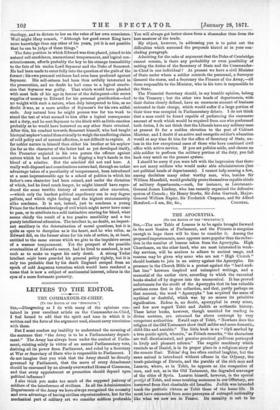LETTERS TO THE EDITOR.
THE COMMANDER-IN-CHIEF.
[TO THE EDITOR OF THE " SPECTATOR:]
SIR,—Disagreeing as I do with many of the opinions con- tained in your excellent article on the Commander-in-Chief, I feel bound to add that the spirit and tone in which it is written and the force of the argument used, almost carry conviction with them.
But I must confess my inability to understand the meaning of the sentence that "the Army is to be a Parliamentary depart- ment." The Army has always been under the control of Parlia- ment, existing solely in virtue of an annual Parliamentary vote, deriving all its power from Parliament, and ruled by a Secretary at War or Secretary of State who is responsible to Parliament. I do not imagine that you wish that the Army should be directly governed by Parliament, that the move of every detachment should be canvassed by an already overworked House of Commons, and that every appointment or promotion should depend upon political influence?
I also think you make too much of the supposed jealousy of soldiers of the interference of civilians. In all the Administrative Departments of the Army we have always recognized the necessity and even advantage of having civilian superintendents, but for the mechanical part of military art we consider soldiers preferable You will always get better shoes from a shoemaker than from the- best amateur of the trade.
My object, however, in addressing you is to point out the difficulties which surround the proposals hinted at in your con- cluding paragraph.
Admitting for the sake of argument that the Duke of Cambridge- cannot remain, is there any probability or even possibility of uniting the duties of the Secretary of State and the Commander- in-Chief in one individual ? At present we have a civil Minister- of State under whom a soldier controls the personnel, a Surveyor General the stores, and a Secretary the Finance of the Army,—all three responsible to the Minister, who in his turn is responsible to the State.
The Financial Secretary should, in my humble opinion, belong to the Treasury ; but the other two heads of departments, with their duties clearly defined, have an enormous amount of business entrusted to their charge, which would suffer if a large portion of their time was occupied in Parliamentary debate. I do not think that a man could be found capable of performing the enormous- amount of work which would be required from one who performed both duties, I do not think that the Liberals have any military man at present fit for a sudden elevation to the post of Cabinet Minister, and I doubt if an active and energetic soldier's education would at any time fit him for the office of Secretary of State, un- less in the few exceptional cases of those who have combined civil office with active service. If you set politics aside, and choose an able soldier to perform the military portion of the duty, you fall back very much on the present system.
I should be sorry if you were left with the impression that there are not many soldiers who would make able administrators (but not political heads of departments). I cannot help naming a few,. among doubtless many other worthy men, who, besides Sir William Mansfield, would probably prove themselves capable chiefs of military departments,—such, for instance, as Lieutenant- General James Lindsay, who has recently organized the defensive - system of Canada ; Sir Henry Storks, Sir John Garvock, Major- General William Napier, Sir Frederick Chapman, and Sir Alfrel


































 Previous page
Previous page